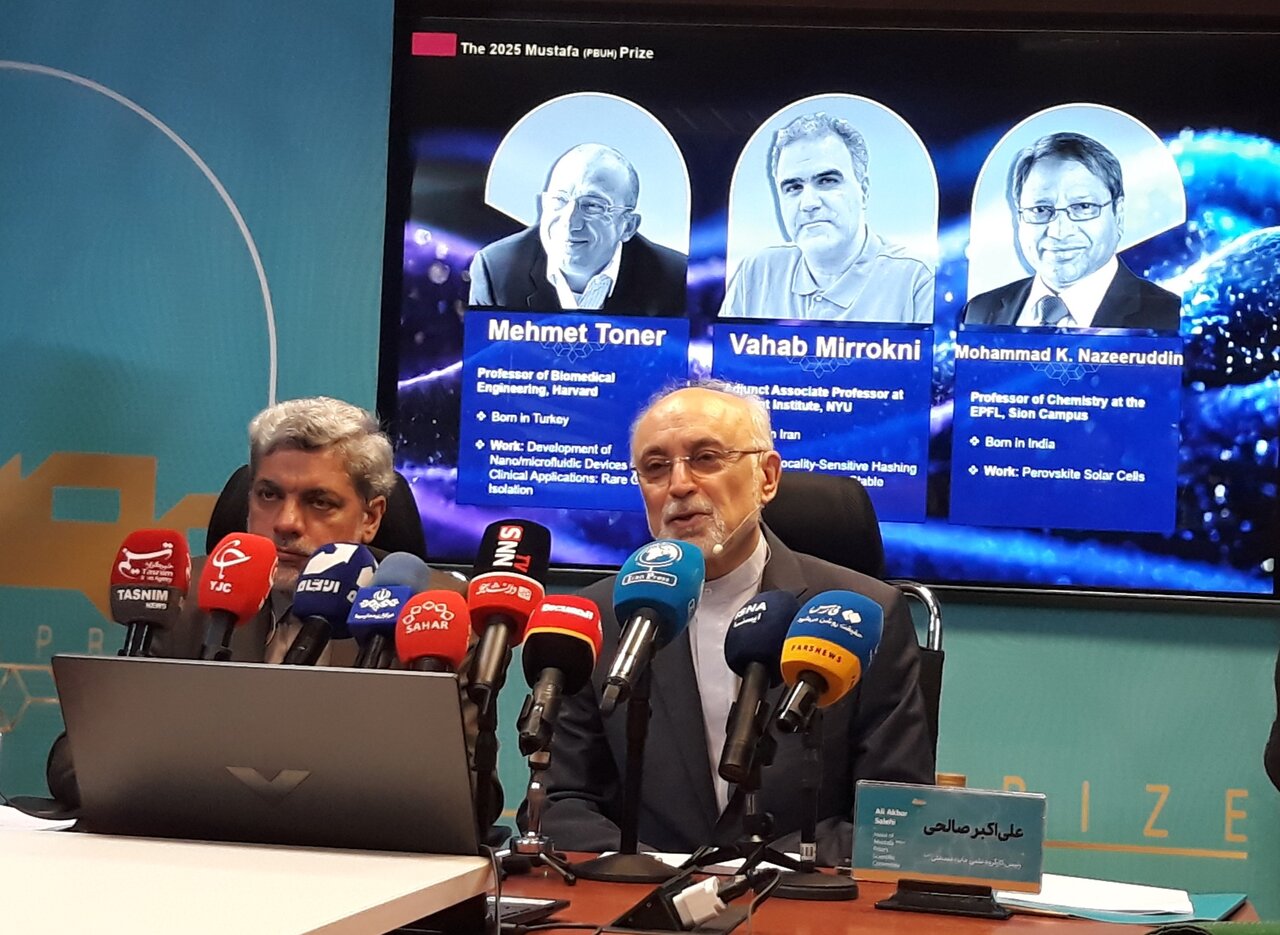Mustafa Prize 2025 announces winners

TEHRAN – The winners of the 6th Mustafa (PBUH) Prize were announced on Tuesday in a press briefing held at the secretariat of the Mustafa Prize in Tehran.
Mehmet Toner, professor of biomedical engineering at Harvard University from Turkey; Vahab Mirrokni, adjunct associate professor at the Courant Institute at New York University from Iran; and Mohammad K. Nazeeruddin, professor of chemistry at the EPFL, Sion Campus, from India, won the prestigious prize.
Mustafa Prize (PBUH) Week 2025
The 6th Mustafa Prize Week will be held from September 6-10 in Tehran. The highlight of this week is the 6th Mustafa Prize Award Ceremony, taking place on September 8 at Vahdat Hall.
The week features academic programs under the title STEP and outreach events under Observatory, alongside the 13th Mustafa Prize Policy-Making Council, the 3rd Advisory Board of the Mustafa Science and Technology Foundation, a seminar on Waqf and the Development of Science and Technology, a gala dinner banquet at the Iran International Innovation Zone, as well as the presentation ceremony of the Young Scientist Medal, which will be held for the first time.
Mustafa Prize background
In order to appreciate prominent scientists and provide the ground for scientific cooperation and development worldwide, the Mustafa Prize was established in 2012 as a symbol of scientific excellence at the international level.
The Mustafa Prize, a top science and technology award, is granted biennially to the top researchers and scientists of the Islamic world in three categories: “Life and Medical Science and Technology”, “Information and Communication Science and Technology”, and “Basic and Engineering Sciences”.
The Prize is granted to works deemed to have improved human life, have made tangible and cutting-edge innovations on the boundaries of science, or have presented new scientific methodology.
The laureates in each category will be awarded USD 500,000/- which is financed through the endowments made to the Prize. The laureates will also be adorned with a special Medal and a certificate.
Twenty percent of the Mustafa Prize is presented in the following categories:
• Awarding research grants to the laureates for presenting to researchers in Islamic countries
• Awarding sabbatical grants to the laureates for presenting to researchers in Islamic countries
• Awarding travel grants to the laureates for attending the events organized by the Mustafa Science and Technology Foundation or other events organized in Islamic countries
• Awarding grants to the laureates for publishing an article with researchers in Islamic countries
• Awarding grants to the laureates for joint projects in Islamic countries
• Awarding grants to the laureates for establishing scientific centers in Islamic countries
• Awarding grants to the laureates for admission of postgraduate students from Islamic countries
• Awarding grants to the laureates for membership and playing a role in the scientific societies of Islamic countries
• Any other program suggested by the laureates approved by the Mustafa Science and Technology Foundation
Jury criteria
The assessment committee of the prize first evaluates the general features and qualifications of the “works” and then sends the selected ones to the scientific committee.
• Submitted works should not have been awarded any other international prizes.
• In the final step, a group of seven high-profile researchers and academics examines the works and selects one according to the following criteria:
Distinctive features of the work
The work should be notably innovative and outstanding; it should have specific applications and tangible results with reasons specified for its significance.
Influence of the work
The work should have already resulted in advancing the frontiers of knowledge; it should also have had a great regional or global impact. Its results should have been published either in the form of a scientific theory or should have had potential for production and wealth generation. Moreover, it should have a visible impact on the economy, culture, society, health, environment, and/or public welfare. The work should also have a share in addressing scientific and technological needs and solving social problems.
Owner of the work
The owner of the work (nominee) should have a high scientific profile and a good reputation. This manifests itself in the number and quality of his/her publications, innovations, patents, etc. The nominee should also have an innovative and holistic scientific spirit.
Photo: Ali-Akbar Salehi (R), the head of the scientific working group of the Mustafa Prize, announces the three winners of the prize in a press briefing in Tehran on Tuesday.
Leave a Comment